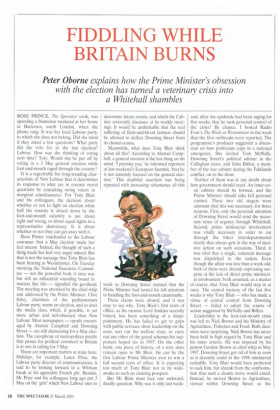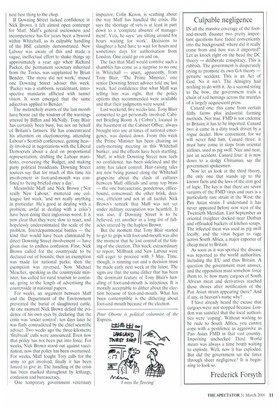FIDDLING WHILE BRITAIN BURNS
Peter Obome explains how the Prime Minister's obsession
with the election has turned a veterinary crisis into a Whitehall shambles
ROSE PRINCE, The Spectator cook, was spending a blameless weekend at her home in Battersea, south London, when the phone rang. It was her local Labour party, to which she does not belong. Did she mind if they asked a few questions? What party did she vote for at the last election? Labour. How was she thinking of voting next time? Tory. Would she be put off by voting in a 3 May general election while foot-and-mouth raged through the country?
It is a regrettable but long-standing characteristic of New Labour that it determines its response to what are in essence moral questions by consulting swing voters in marginal constituencies. For Tony Blair and his colleagues, the decision about whether or not to fight an election while half the country is closed down by the foot-and-mouth calamity is not about right and wrong, or about equal rights in a representative democracy. It is about whether or not they can get away with it.
Rose Prince vouchsafed to the Labour canvasser that a May election made her feel uneasy. Indeed, the thought of such a thing made her feel very angry indeed. But that is not the message that Tony Blair has been hearing at Westminster. On Tuesday morning the National Executive Committee — not the powerful body it once was but still an influential sounding board in matters like this — signalled the go-ahead. The meeting was attended by the chief whip and addressed by the Prime Minister. Clive Soley, chairman of the parliamentary Labour party, wants an election, and so does the media class, which, if possible, is yet more urban and self-obsessed than New Labour. Most newspapers — openly encouraged by Alastair Campbell and Downing Street — are still clamouring for a May election. The cacophony of metropolitan prattle that passes for political comment in Britain is at one in calling for 3 May.
There are important matters at stake here. Holidays, for example. Lance Price, the Labour party director of communications, is said to be looking forward to a Whitsun break at his agreeable French gite. Besides, Mr Price and his colleagues long ago put 3 May on the 'grid' which New Labour uses to determine future events, and which the Cabinet reverently discusses at its weekly meetings. It would be unthinkable that the real suffering of flesh-and-blood farmers should be allowed to deflect Downing Street from its chosen course.
Meanwhile, what does Tony Blair think about all this? According to Alastair Campbell, a general election is the last thing on his mind. 'I promise you,' he informed reporters at last weekend's European Summit, 'that he is not remotely focused on the general election.' This doubtful assertion was being repeated with increasing vehemence all this week as Downing Street insisted that the Prime Minister had turned his full attention to handling the foot-and-mouth catastrophe.
These claims were absurd, and it was easy to see why. Tony Blair's first term of office, as his mentor Lord Jenkins recently hinted, has been something of a disappointment. He has failed to get to grips with public services, show leadership on the euro, sort out the welfare state, or carry out any other of the grand schemes his supporters hoped for in 1997. On the other hand, one piece of history, of a sort, does remain open to Mr Blair. He can be the first Labour Prime Minister ever to win a full second term of office. It is expecting too much of Tony Blair not to be wideawake to such an enticing prospect.
But Mr Blair must face one awkward, deadly question. Why was it only last week
end, after the epidemic had been raging for five weeks, that he took personal control of the crisis? By chance, I hosted Radio Four's The Week at Westminster in the week that the first outbreaks were reported. The programme's producer suggested a discussion on how politicians cope in a national emergency. She invited Tom McNally, Downing Street's political adviser in the Callaghan years, and John Biffen, a member of the war cabinet during the Falklands conflict, on to the show.
Neither of them was in any doubt about how government should react. An inner-cri sis cabinet should be formed, and the Prime Minister should take full personal control. These two old stagers were adamant that this was necessary, for three reasons. First, only the personal attention of Downing Street would send the neces sary sense of urgency through Whitehall.
Second, prime ministerial involvement was vitally necessary in order to cut through the bitter interdepartmental rivalry that always gets in the way of deci sive action on such occasions. Third, it was vital that a single, coherent message was dispatched to the nation. Even
though the affair was less than a week old,
both of them were already expressing sur prise at the lack of direct prime ministeri al involvement: both assumed, as a matter of course, that Tony Blair would step in at once. The central mystery of the last five weeks is why Tony Blair — who has made a virtue of central control from Downing Street — failed to adopt the course of action suggested by McNally and Biffen.
Leadership in the foot-and-mouth crisis was left to Nick Brown and his Ministry of Agriculture, Fisheries and Food. Both decisions were surprising. Nick Brown has never been held in high regard by Tony Blair and his inner coterie. He was imposed by his patron Gordon Brown as chief whip in May 1997. Downing Street got rid of him as soon as it decently could in the 1998 ministerial reshuffle. Tony Blair would have preferred to sack him, but shrank from the confrontation that such a drastic move would entail. Instead, he moved Brown to Agriculture, viewed within Downing Street as the next best thing to the chop.
If Downing Street lacked confidence in Nick Brown, it felt almost open contempt for Maff. Maffs general uselessness and incompetence has for years been a byword within Whitehall, as its culpable handling of the BSE calamity demonstrated. New Labour was aware of this and made a vague, ineffectual effort to shake things up approximately a year ago when Richard Packer, the permanent secretary inherited from the Tories, was supplanted by Brian Bender. 'The move did not work,' mused one Downing Street adviser this week. 'Packer was a stubborn, recalcitrant, introspective mandarin afflicted with tunnel vision. It soon emerged that the same adjectives applied to Bender.'
The melancholy events of the last month have borne out the wisdom of the warnings uttered by Biffen and McNally. Tony Blair has certainly been busy, but not on behalf of Britain's farmers. He has concentrated his attention on electioneering, attending Labour's Scottish conference, getting heavily involved in negotiations with the Liberal Democrats about a deal on proportional representation, drafting the Labour manifesto, overseeing the Budget, and making party political broadcasts. Downing Street sources say that for much of this time his involvement in foot-and-mouth was confined to 'being briefed once a day'.
Meanwhile Maff and Nick Brown ('Not really New Labour,' muttered one colleague last week, 'and not really anything in particular. He's good at dealing with a problem, awful at dealing with a crisis') have been doing their inglorious worst. It is now clear that they were slow to react. and hopelessly underestimated the scale of the problem. Interdepartmental battles — the kind that would have been eliminated by direct Downing Street involvement — have given rise to endless confusion, First, Nick Brown called for the countryside to be declared out of bounds; then an exemption was made for national parks; then the exemption was reversed. Now Michael Meacher, speaking as the countryside minister, has called for rural tourism to continue, going to the length of advertising the countryside in national papers.
For weeks, an argument between Maff and the Department of the Environment prevented the burial of slaughtered cattle. At one moment Nick Brown defied the evidence of his own eyes by declaring that the crisis was 'under control': ten days later he was flatly contradicted by the chief scientific adviser. Two weeks ago the three-kilometre 'firebreak' culls were announced. Even now that policy has not been put into force. For weeks, Nick Brown stood out against vaccination; now that policy has been overturned. For weeks, Maff fought Tory calls for the army to get involved; finally it has been forced to give in. The handling of the crisis has been marked throughout by lethargy, confusion and bureaucracy.
One temporary government veterinary inspector, Colin Keron, is scathing about the way Maff has handled the crisis. He says the shortage of vets is at least in part down to a 'complete absence of management'. Vets. he says, 'are sitting around for hours waiting for work'. Decisions to slaughter a herd have to wait for hours and sometimes days for authorisation from London. One could go on and on.
The fact that Maff would contrive such a shambles has come as a surprise to no one in Whitehall — apart, apparently, from Tony Blair. 'The Prime Minister,' one senior Downing Street adviser told me last week, 'had confidence that what Maff was telling him was right, that the policy options they recommended were available and that their judgments were sound.'
Last weekend, five weeks late, Tony Blair consented to get personally involved. Cabinet Briefing Room A (Cobra), located in the basement of the Cabinet Office, always brought into use at times of national emergency, was dusted down. From this week the Prime Minister has been chairing an early-morning meeting in this Whitehall bunker, and the effects have been startling. Maff, in which Downing Street now feels no confidence, has been sidelined and the army has taken control. Hair-raising tales are now being passed along the Whitehall grapevine about the clash of cultures between Maff officials and army top brass — the one bureaucratic. ponderous, officebound, consensual: the other brisk, decisive, efficient and not at all tactful. Nick Brown's remark that Maff was not yet under military occupation was heartfelt. It was also, if Downing Street is to be believed, yet another in a long list of fallacies uttered by the hapless Brown.
But the moment that Tony Blair started to get to grips with foot-and-mouth was also the moment that he lost control of the timing of the election. This week, extraordinary to report, Millbank and New Labour were still eager to proceed with 3 May. Time, though, is running out and a decision must be made early next week at the latest. The signs are that the same dither that has been the dominant feature of Tony Blair's handling of foot-and-mouth is infectious. It is morally acceptable to dither about the election because of foot-and-mouth. What has been contemptible is the dithering about foot-and-mouth because of the election.
Peter Obome is political columnist of the Express



























































































 Previous page
Previous page